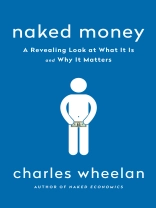Charles Wheelan’s wonderfully whimsical, best-selling Naked series tackles the weird, surprisingly colorful world of money and banking.
Consider the $20 bill.
It has no more value, as a simple slip of paper, than Monopoly money. Yet even children recognize that tearing one into small pieces is an act of inconceivable stupidity. What makes a $20 bill actually worth twenty dollars? In the third volume of his best-selling Naked series, Charles Wheelan uses this seemingly simple question to open the door to the surprisingly colorful world of money and banking.
The search for an answer triggers countless other questions along the way: Why does paper money (“fiat currency” if you want to be fancy) even exist? And why do some nations, like Zimbabwe in the 1990s, print so much of it that it becomes more valuable as toilet paper than as currency? How do central banks use the power of money creation to stop financial crises? Why does most of Europe share a common currency, and why has that arrangement caused so much trouble? And will payment apps, bitcoin, or other new technologies render all of this moot?
In Naked Money, Wheelan tackles all of the above and more, showing us how our banking and monetary systems should work in ideal situations and revealing the havoc and suffering caused in real situations by inflation, deflation, illiquidity, and other monetary effects. Throughout, Wheelan’s uniquely bright-eyed, whimsical style brings levity and clarity to a subject often devoid of both. With illuminating stories from Argentina, Zimbabwe, North Korea, America, China, and elsewhere around the globe, Wheelan demystifies the curious world behind the paper in our wallets and the digits in our bank accounts.
About the author
Charles Wheelan is the author of the best-selling Naked Statistics and Naked Economics and is a former correspondent for the Economist. He teaches public policy at Dartmouth College and lives in Hanover, New Hampshire, with his family.












